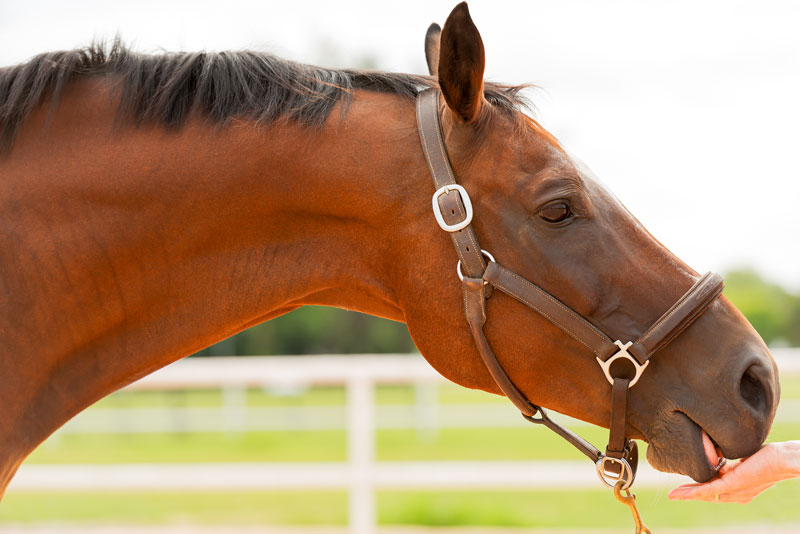If you’ve owned a horse for a long time, you’ll understand the importance of having the right veterinarian to call upon when there’s an injury or a life-threatening emergency, such as colic.
But how do you know you have the right equine expert to give you the best advice for your horse and provide the best care possible? Instead of settling for simple convenience or cheapest cost, you can choose a vet that suits you and your horse’s particular needs, says equine veterinarian and Australia’s leading veterinary coach, Dr Diederik Gelderman.
There are two types of equine veterinarians — solo (mobile) practitioners and veterinarians who work at a multi-veterinary (fixed site) practice. One third of equine vets in Australia are mobile vets, as most prefer to work in a collegial atmosphere, says Dr Diederik, who is a mobile practitioner from Gelderman and Merriott Mobile Equine Services.
Whether you’re considering a mobile vet or one based at a hospital — equine only or mixed species — what needs to come first is the relationship with the veterinarian, he explains.
“It doesn’t matter if they have the best facility or equipment. You need to be able to have an open and honest conversation with your vet. If that relationship doesn’t exist, nothing else matters,” he says.
Dr Diederik explains the pros and cons of the equine services offered by solo practitioners compared with vets at multi-veterinary practices.
Pros and cons of vet hospitals and mobile vets
Multi-vet hospitals are fixed sites — although most do send their vets out to clients — and are able to house more equipment, such as MRI (magnetic resonance imaging) and CT (computed tomography) scans, unlike mobile vets who are limited by logistics.
“In America, mobile veterinarians commonly get around with a truck with a laboratory and quite a bit of equipment inside, where they can run blood tests on the spot. Few mobile vets in Australia do this,” says Dr Diederik.
From a horse owner’s perspective, hauling such a large animal to a hospital can be time-consuming and sometimes more costly. Mobile vets charge $95–$140, while fixed-site veterinary hospital consultations cost $85–$95, he adds.
“From a cost perspective, consultation fees in the field are higher than those of bringing the animal to a hospital. But you have travel costs to consider, and using high-end x-ray and ultrasound machines is dearer, so a mobile vet consultation can work out to be cheaper,” he explains.
Fortunately, horse insurance is available to help pay for vet bills — which can cost in the thousands for colic surgery — whether your horse is treated by a mobile vet or at a veterinary hospital.
“Most clients in Australia prefer a vet to come to them unless they want a second opinion or their horse is so badly injured they need to go to a hospital,” says Dr Diederik.
Mobile vets are not without important diagnostic equipment, however. They carry x-ray, ultrasound and anaesthetic machines, and are able to do minor surgeries in the field (such as castration or stitch-ups).
However, while veterinary hospitals have large, fixed x-ray machines that can scan the entire horse (including larger parts such as pelvis, chest and abdomen), mobile vets carry equipment that scan parts of the horse — mainly head, legs or reproductive area.
“For many horse owners, mobile vets are a more convenient option and fixed sites are backup when needed,” says Dr Diederik.
However, one disadvantage with solo practitioners is their limited availability, he says, adding that you should discuss night-time and weekend backup plans with your vet, no matter what type of practice they are from.
Choosing a veterinarian
Whether the hospital is for horses only or for mixed species, the relationship with the vet needs to come first, he explains.
When considering a hospital, Dr Diederik would be investigating the staff’s qualifications and checking the quality of the premises — if it’s up to date and has modern equipment. Does the hospital have a strong OH&S policy and do the staff have adequate and up-to-date training and skills?
If you’re considering a solo practitioner, your relationship with the vet is also important. Also, check for up-to-date training, skills and equipment, Dr Diederik adds.
“The biggest problem in the vet industry is that a lot of vets run late, so consider someone who is timely,” he says. “Plus someone who is knowledgeable and willing to share information and educate, which is more important in the field than at a hospital because mobile vets deal more with routine horse care. A lot of the problems (such as hoof care and cuts) can be prevented if the owner is adequately educated.”
Whether your vet is mobile or at a hospital, it’s also crucial for him or her to have a good relationship with your horse!
“Many vets are great with technical knowledge, but not horse behaviour,” he says. “Watch how the vet handles your horse. How does your horse react to the vet?”
A veterinarian should be a calm, confident and highly effective horse handler — never lose their temper even with difficult horses — and procedures should go smoothly and easily, Dr Diederik adds.
“The vet should be able to explain what he or she is going to do to treat the horse, and whatever the treatment or solution the procedure should look like it’s easy rather than a marathon struggle,” he says.
Specialist equine veterinarians
We are in an era of veterinary specialists and there is an increasing number of vets with more specialist skills sets, says Dr Diederik.
“A vet can become more specialised in reproduction, natural therapies or dentistry, for instance, or have a particular interest in something without being a specialist,” he says. “Find out what skill sets your vet has and don’t be afraid to ask for a referral to someone who has more knowledge and expertise in the area to help improve patient outcome.”
It’s important to remember that not all health problems end well, no matter how qualified and skilled your veterinarian is, whether they are a solo practitioner or work at an equine hospital.
“At the end of the day, you need to feel that you’ve chosen the most suitable vet for your horse and that vet did everything possible for your beloved horse,” says Dr Diederik.
Careful what you read online!
The Internet has a lot of information and medical advice about horses, but not everything you read online is correct, says equine veterinarian Dr Diederik Gelderman.
One of the major problems Dr Diederik sees is horse owners posting questions on Facebook to their friends about their horse’s condition rather than calling a vet.
“I once saw on Facebook a client posted an enquiry and photo of her horse, which seemed to have hives. Some of the advice posted could have caused the horse more harm than good. I had to stop the posts by sharing scientific knowledge, and advised calling the vet. Sadly, you see this happen all the time,” he says.
Dr Diederik runs free webinars on a number of horse health topics. For further information, visit mobileequinevets.com.au and/or check out their Facebook page.



Leave a Reply